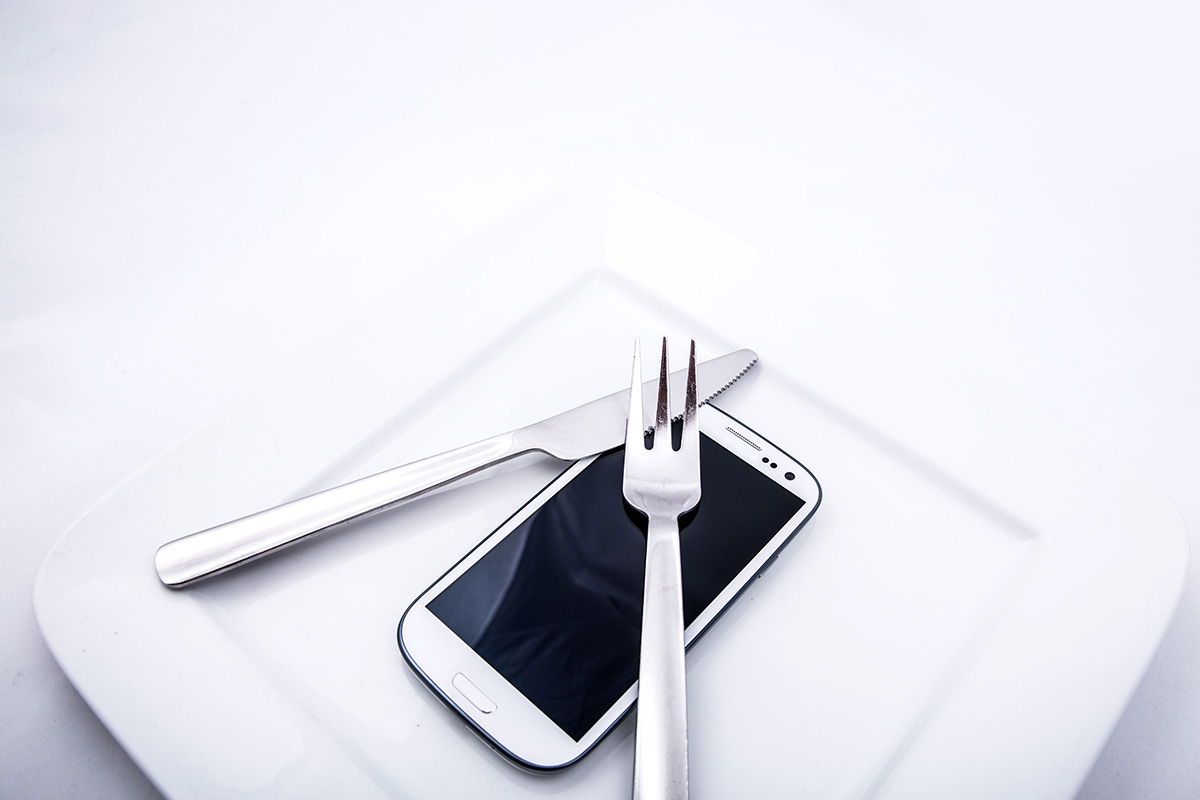 Hear the word etiquette and what comes to mind is which fork to use with what course, but that definition is as passé as formal dinner parties are today. “We aren’t living in Downton Abbey,” says Amy Alkon, Author of Good Manners For Nice People Who Sometimes Say F*ck. “What matters is making people comfortable and happy in your presence. Empathy is at the root of manners. You need to understand how your behavior affects others.”
Hear the word etiquette and what comes to mind is which fork to use with what course, but that definition is as passé as formal dinner parties are today. “We aren’t living in Downton Abbey,” says Amy Alkon, Author of Good Manners For Nice People Who Sometimes Say F*ck. “What matters is making people comfortable and happy in your presence. Empathy is at the root of manners. You need to understand how your behavior affects others.”
Sadly, as a society we’ve gotten pretty bad at this. Today, we live in a me-centric culture where many people run through the day as if they’re operating in a bubble with seemingly utter disregard for anyone around. According to Alkon, it’s not our fault that we’re getting ruder, it’s a function of how society has changed. “We live in societies that are too big for our brains,” she explains. “We have the capacity for 150 relationships, and beyond that anthropologic studies show it breaks down.”
 In small tribes and communities, reputation mattered; people were held accountable for their behavior. But in our current global society, there aren’t consequences for many bad behaviors. Flip a driver the bird and no one looks twice. “We need to start thinking about strangers as people who matter,” says Alkon. “Our cover charge for living in this world should be one act of kindness a day. Small acts mean a lot. It’s amazing the reaction you’ll get from strangers.”
In small tribes and communities, reputation mattered; people were held accountable for their behavior. But in our current global society, there aren’t consequences for many bad behaviors. Flip a driver the bird and no one looks twice. “We need to start thinking about strangers as people who matter,” says Alkon. “Our cover charge for living in this world should be one act of kindness a day. Small acts mean a lot. It’s amazing the reaction you’ll get from strangers.”
“Today, we live in a me-centric culture where many people run through the day as if they’re operating in a bubble with utter disregard for anyone around.”
One way to start showing people they matter is simply to give them your full attention. “The biggest challenge to etiquette today is electronic communication,” says Pamela Eyring, Founder of The Protocol School Of Washington. We’ve all probably been guilty of it, and been victims of it. Our devices have become an extension of ourselves to the point of addiction. Even when we’re physically in someone’s company, we’ll often answer a text message or even a call. “I recommend putting your phone away or turning it off,” she says. “Even if it’s on vibrate, the minute we hear the buzz or see a light we’re distracted and fighting the urge to check it.”
 If you’re expecting an important call or message and must keep the phone on when you’re with others, make sure to let them know ahead of time. And if you do take a call in a public place, remember you’re not in private and you need to use your indoor voice — many of us have a tendency to talk loudly when we’re on the phone. Another pitfall is believing that the minute you get on your phone an invisible phone booth appears. Stop having very private conversations when everyone can hear you. No one wants to listen to R-rated details about your bad date or little Timmy’s colic. If you use your phone to listen to music, realize that even with headphones people around you can hear it if the volume is cranked up. “It all comes down to respect,” says Eyring.
If you’re expecting an important call or message and must keep the phone on when you’re with others, make sure to let them know ahead of time. And if you do take a call in a public place, remember you’re not in private and you need to use your indoor voice — many of us have a tendency to talk loudly when we’re on the phone. Another pitfall is believing that the minute you get on your phone an invisible phone booth appears. Stop having very private conversations when everyone can hear you. No one wants to listen to R-rated details about your bad date or little Timmy’s colic. If you use your phone to listen to music, realize that even with headphones people around you can hear it if the volume is cranked up. “It all comes down to respect,” says Eyring.
“The more casual our society becomes, the more opportunities there are for etiquette missteps, especially in the business arena.”
Because we live in an instant society, people expect an immediate response when they get in touch with you either by text, email or a voicemail. Responding within 24 hours of communication is a reasonable standard. “Even if you don’t have the answer, you should respond,” says Eyring. “People want to know they have been heard so it’s appropriate to say you have received the message and need more time to respond.”
And when you finally respond via text or email, it’s important to use correct grammar if it’s for work. “Your first email to someone should be as formal as if you were writing a letter,” explains Patti Wood, a Body Language Expert & Author of Snap: Making The Most Of First Impressions, Body Language & Charisma. She also says it’s important not to use “text abbreviations” such as u, ur and the like.
 The more casual our society becomes, the more opportunities there are for etiquette missteps, especially in the business arena. Increasingly, interviews, especially in big cities, are taking place in casual settings like coffee shops, but as a candidate you shouldn’t be casual. Employers are still looking for people who represent the company well and fit the corporate culture. They’re watching your body language, your speech and what you wear. Be on guard not to be too casual or open up and share too many personal details. And if you really want to wow the interviewer, send a handwritten thank-you note via snail mail after the meeting.
The more casual our society becomes, the more opportunities there are for etiquette missteps, especially in the business arena. Increasingly, interviews, especially in big cities, are taking place in casual settings like coffee shops, but as a candidate you shouldn’t be casual. Employers are still looking for people who represent the company well and fit the corporate culture. They’re watching your body language, your speech and what you wear. Be on guard not to be too casual or open up and share too many personal details. And if you really want to wow the interviewer, send a handwritten thank-you note via snail mail after the meeting.
“If you want an easy way to never make an etiquette mistake in the 21st Century, you can go back to the age-old golden rule: “Do unto others as you’d want done to you.”
Moreover, our penchant for multi-tasking has also taken its toll on our ability to listen. Not paying attention to whom we’re speaking with is a major etiquette faux pas in both business and social settings. “We’re in such a hurry to get to the next task we don’t pay attention and it shows,” says Eyring. “It comes out when our eyes are darting all over the room and not focused on the person we’re with.”
Back in the day of Emily Post, etiquette rules were also clearly divided by gender, but today those conventions are also murky, especially for men. Do you pull out the chair? Open the car door? Or not? “When it’s done from a place of respect, it’s wonderful,” says Jodi RR Smith of Mannersmith Etiquette Consulting.
 Even in the age of feminism, many women still want a chivalrous man because those small acts of kindness and respect are cues to deeper personality traits. But when it comes to business, the rules are different. “It’s very simple: In business, we’re gender neutral,” says Smith. “It’s all about rank.” For example, the less senior member should open the door or hold an elevator open, while the senior employee should pick up a check at a business dinner.
Even in the age of feminism, many women still want a chivalrous man because those small acts of kindness and respect are cues to deeper personality traits. But when it comes to business, the rules are different. “It’s very simple: In business, we’re gender neutral,” says Smith. “It’s all about rank.” For example, the less senior member should open the door or hold an elevator open, while the senior employee should pick up a check at a business dinner.
Another important etiquette area surrounds traveling. The news has been filled with stories of air rage and mind-boggling behavior. Some basic courtesy is needed on cramped planes including not slamming back your seat if you must recline, allowing the person in the middle seat access to the shared armrest, controlling your children and using headphones if you’re listening to music, watching a movie or playing games. If you want an easy way to never make an etiquette mistake in the 21st Century, you can go back to the age-old golden rule: “Do unto others as you’d want done to you.”
 MIND YOUR MANNERS
MIND YOUR MANNERS
Local Etiquette Expert Jacqueline Whitmore, Founder of The Protocol School Of Palm Beach & Author of Poised For Success: Mastering The Four Qualities That Distinguish Outstanding Professionals, talks about the changing nature of etiquette in South Florida and beyond.
Interview by Dena Roché
Q: Why is etiquette important?
A: “Etiquette in the old days provided rules to live by. Good manners meant you came from a good family. Today, etiquette is knowing how to treat others and make them comfortable in your presence. It’s about being mindful of how you treat others and how your behavior affects them. Etiquette is a tool in business and in life you can use to get ahead and stand out. People do business with people they like. If you’re likeable, people will give you a chance. Not using the right fork can be overlooked when you’re charming and considerate.
Q: What are your views of etiquette in South Florida?
A: “South Florida is a melting pot of cultures, lifestyles and nationalities. It’s an interesting place to live, but it can be challenging. There are many languages and our lack of awareness of other cultures can make us inadvertently seem closed-minded. Miami is also a transient place, so we often don’t get to know our neighbors enough.
Q: Any advice for folks looking to work on their etiquette?
A: “Start in your own office or neighborhood — it’s about making an impact where you live. Do small, kind things like practicing more patience or keeping the temperature in check in the office. Learn to put yourself in someone else’s shoes.”
Q: What advice do you have for parents?
A: “Be a mannerly parent. Children mirror behavior. If you’re always on your phone or screaming at others, your children will think that behavior is OK and will end up doing the same thing. But don’t think it’s ever too early to start teaching manners. As soon as a child can walk or talk, they can learn manners.”











